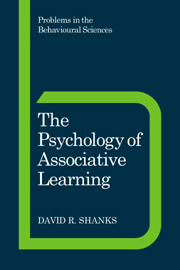Preface
Published online by Cambridge University Press: 26 January 2010
Summary
The place of learning theory in psychology has fluctuated dramatically over the last few decades. At the height of the behaviourist era in the 1940s and 1950s, many people would have identified learning as the single most important topic of investigation in psychology. By the 1970s, though, the picture was very different. A large number of influential psychologists had come to regard learning theory as a sterile field that made little contact with the realities of human cognition, and instead their interest switched towards such topics as knowledge representation and inference. Lately, things have come full circle, and the expanding new field of connectionism has restored learning theory to centre stage.
My aim in this book has been to have a fresh look at learning theory. I believe that the changing fortunes of the field have occurred because psychologists have often come to the topic of learning with certain deep conceptions of the mind already in place. But I suggest that rather than seeing learning as a topic to be annexed by and interpreted in terms of whatever the current fashionable theory happens to be, it is far more profitable for traffic to flow in the opposite direction. Let us commence by asking some general questions about learning, and see what sort of mind we end up with.
Someone coming to the field of learning afresh is likely to be disconcerted by the apparent incompatibility of a number of theoretical approaches and even terminologies.
- Type
- Chapter
- Information
- The Psychology of Associative Learning , pp. xi - xiiPublisher: Cambridge University PressPrint publication year: 1995



